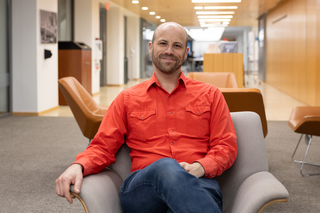New Leadership Role to Further AI Strategies and Policies

Ben Glaser, Director of AI initiatives in the Humanities
The Poorvu Center for Teaching and Learning and Yale Library have partnered to create a new leadership role to support the university’s efforts to integrate artificial intelligence (AI) technologies into teaching and research practices across the humanities.
Effective July 1, Ben Glaser—associate professor of English, specializing in the study of poetry and poetics—will assume the joint appointment of director of AI initiatives in the humanities. In this role, Glaser will lead the development of university-wide strategies to explore the incorporation of AI into teaching and research while helping to shape policies and practices for its ethical use. This role will be a joint appointment between the Poorvu Center and Yale Library. Glaser will also collaborate with Poorvu Center teams to consult with faculty in the exploration of AI in teaching and curriculum development.
“There is increasing interest from humanities faculty to integrate AI applications into their courses and provide opportunities for their students to engage with this technology,” said Rebecca Dikow, the library’s director of Computational Methods and Data. “We are excited to partner with Ben and the Poorvu Center in order to meet the instructional and research support needs in this growing area.”
AI in Education
Glaser comes to this position with an extensive humanities background and experience studying AI’s influence on education. Recently, Glaser designed two new courses on AI, including “Writing Essays with AI” and an English seminar, “Poetry and AI,” which paired close readings of poetic form with an introduction to programming and natural language processing. He will transition into the role from his current appointment as associate professor in English, bringing the unique perspective and rigorous approaches of inquiry that characterize the humanities at Yale.
As AI technology continues to evolve, Glaser recognizes the opportunity to infuse its application more prevalently across humanities disciplines. He has collaborated with students and colleagues to explore innovative applications of AI tools, including recent work to assess the performance of particular AI models in the generation and analysis of poetry – a confluence of his research interests and strong publication background in poetry and poetics. Glaser, whose publications make extensive use of the Beinecke’s James Weldon Johnson Memorial Collection, is excited to continue working with physical and digitized archives.
“Ben’s expertise in humanistic research, combined with his innovative approaches to integrating AI into teaching, will strengthen research and learning service across Yale Library and the Poorvu Center,” said Lauren DiMonte, associate university librarian for Research and Learning.
As director of AI initiatives in the humanities, Glaser plans to develop group consultations with faculty around AI engagement in research and teaching, explore AI’s role in writing and composition, and develop streamlined access to AI resources for faculty and students. He looks forward to consulting with all faculty – including those who may be skeptical about the technology’s use as a teaching and learning tool – to study AI’s evolution and impact in higher education.
The emerging focus on AI in research and teaching complements other work being done by DiMonte’s team to support data-intensive research, including in digital humanities, geographic information systems, and computational methods and data.
The Growing Partnership
The Poorvu Center and Yale Library have a strong history of collaboration. Following the release of the 2024 report of the Yale Task Force on Artificial Intelligence, the two organizations partnered to develop an AI Literacy Framework to guide faculty in supporting students’ use of AI as an effective and ethical learning tool. Glaser’s joint role will strengthen this existing partnership while enhancing opportunities for future projects.
“Yale is committed to leading discussions about the practical, ethical, and responsible use of generative AI in higher education,” explains Jennifer Frederick, executive director at the Poorvu Center and Associate Provost for Academic Initiatives. “The powerful perspective Ben brings to this role will help us advance this work in alignment with the recommendations of the Task Force and in continued partnership with Yale Library.”
The Poorvu Center is a hub for teaching and learning at Yale, providing a wide array of resources and support for students and faculty across the university. In 2017, the Center moved to its current location in Sterling Memorial Library, thus expanding the opportunities for partnership and shared resources with Yale Library.
With a dozen libraries and locations, more than 500 staff, and an expansive online presence, Yale Library facilitates research, teaching, and practice across all disciplines at Yale. The library also supports researchers locally and globally with expanded access to Yale’s vast collections of primary sources, archives, and other rare materials.
Elizabeth DeRosa, Director of Communications, Poorvu Center for Teaching and Learning